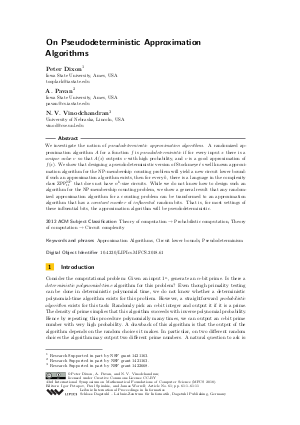On Pseudodeterministic Approximation Algorithms
Authors Peter Dixon, A. Pavan, N. V. Vinodchandran
-
Part of:
Volume:
43rd International Symposium on Mathematical Foundations of Computer Science (MFCS 2018)
Part of: Series: Leibniz International Proceedings in Informatics (LIPIcs)
Part of: Conference: Mathematical Foundations of Computer Science (MFCS) - License:
 Creative Commons Attribution 3.0 Unported license
Creative Commons Attribution 3.0 Unported license
- Publication Date: 2018-08-27
File

PDF
LIPIcs.MFCS.2018.61.pdf
- Filesize: 424 kB
- 11 pages
Document Identifiers
Subject Classification
ACM Subject Classification
- Theory of computation → Probabilistic computation
- Theory of computation → Circuit complexity
Keywords
- Approximation Algorithms
- Circuit lower bounds
- Pseudodeterminism
Metrics
- Access Statistics
-
Total Accesses (updated on a weekly basis)
0Document
0Metadata
Abstract
We investigate the notion of pseudodeterminstic approximation algorithms. A randomized approximation algorithm A for a function f is pseudodeterministic if for every input x there is a unique value v so that A(x) outputs v with high probability, and v is a good approximation of f(x). We show that designing a pseudodeterministic version of Stockmeyer's well known approximation algorithm for the NP-membership counting problem will yield a new circuit lower bound: if such an approximation algorithm exists, then for every k, there is a language in the complexity class ZPP^{NP}_{tt} that does not have n^k-size circuits. While we do not know how to design such an algorithm for the NP-membership counting problem, we show a general result that any randomized approximation algorithm for a counting problem can be transformed to an approximation algorithm that has a constant number of influential random bits. That is, for most settings of these influential bits, the approximation algorithm will be pseudodeterministic.
Cite As Get BibTex
Peter Dixon, A. Pavan, and N. V. Vinodchandran. On Pseudodeterministic Approximation Algorithms. In 43rd International Symposium on Mathematical Foundations of Computer Science (MFCS 2018). Leibniz International Proceedings in Informatics (LIPIcs), Volume 117, pp. 61:1-61:11, Schloss Dagstuhl – Leibniz-Zentrum für Informatik (2018)
https://doi.org/10.4230/LIPIcs.MFCS.2018.61
BibTex
@InProceedings{dixon_et_al:LIPIcs.MFCS.2018.61,
author = {Dixon, Peter and Pavan, A. and Vinodchandran, N. V.},
title = {{On Pseudodeterministic Approximation Algorithms}},
booktitle = {43rd International Symposium on Mathematical Foundations of Computer Science (MFCS 2018)},
pages = {61:1--61:11},
series = {Leibniz International Proceedings in Informatics (LIPIcs)},
ISBN = {978-3-95977-086-6},
ISSN = {1868-8969},
year = {2018},
volume = {117},
editor = {Potapov, Igor and Spirakis, Paul and Worrell, James},
publisher = {Schloss Dagstuhl -- Leibniz-Zentrum f{\"u}r Informatik},
address = {Dagstuhl, Germany},
URL = {https://drops.dagstuhl.de/entities/document/10.4230/LIPIcs.MFCS.2018.61},
URN = {urn:nbn:de:0030-drops-96431},
doi = {10.4230/LIPIcs.MFCS.2018.61},
annote = {Keywords: Approximation Algorithms, Circuit lower bounds, Pseudodeterminism}
}
Author Details
Funding
- Dixon, Peter: Research Supported in part by NSF grant 1421163.
- Pavan, A.: Research Supported in part by NSF grant 1421163.
- Vinodchandran, N. V.: Research Supported in part by NSF grant 1422668.
References
-
S. Aaronson. Oracles are subtle but not malicious. In IEEE Conference on Computational Complexity, pages 340-354, 2006.

-
S. Arora and B. Barak. Computational Complexity - A Modern Approach. Cambridge University Press, 2009.

-
M. Bellare, O. Goldreich, and E. Petrank. Uniform generation of np-witnesses using an np-oracle. Inf. Comput., 163(2):510-526, 2000.

-
N. H. Bshouty, R. Cleve, R. Gavaldà, S. Kannan, and C. Tamon. Oracles and queries that are sufficient for exact learning. J. Comput. Syst. Sci., 52(3):421-433, 1996.

-
J-Y. Cai. S^p_2 subseteq zpp^np. In 42nd Annual Symposium on Foundations of Computer Science, FOCS 2001, 14-17 October 2001, Las Vegas, Nevada, USA, pages 620-629, 2001.

-
J. Y. Cai, R. Lipton, L. Longpré, M. Ogihara, K. Regan, and D. Sivakumar. Communication complexity of key agreement on small ranges. In STACS, pages 38-49, 1995.

-
E. Gat and S. Goldwasser. Probabilistic search algorithms with unique answers and their cryptographic applications. Electronic Colloquium on Computational Complexity (ECCC), 18:136, 2011.

-
O. Goldreich, S. Goldwasser, and D. Ron. On the possibilities and limitations of pseudodeterministic algorithms. In Innovations in Theoretical Computer Science, ITCS '13, Berkeley, CA, USA, January 9-12, 2013, pages 127-138, 2013.

-
S. Goldwasser and O. Grossman. Bipartite perfect matching in pseudo-deterministic NC. In 44th International Colloquium on Automata, Languages, and Programming, ICALP 2017, July 10-14, 2017, Warsaw, Poland, pages 87:1-87:13, 2017.

-
S. Goldwasser, O. Grossman, and D. Holden. Pseudo-deterministic proofs. CoRR, abs/1706.04641, 2017.

-
O. Grossman. Finding primitive roots pseudo-deterministically. Electronic Colloquium on Computational Complexity (ECCC), 22:207, 2015.

-
O. Grossman and Y. Liu. Reproducibility and pseudo-determinism in log-space. Electronic Colloquium on Computational Complexity (ECCC), 25:48, 2018.

-
R. Kannan. Circuit-size lower bounds and non-reducibility to sparse sets. Information and Control, 55(1-3):40-56, 1982.

-
A. Klivans and D. Melkebeek. Graph nonisomorphism has subexponential size proofs unless the polynomial-time hierarchy collapses. SIAM J. Comput., 31(5):1501-1526, 2002.

-
J. Köbler and O. Watanabe. New collapse consequences of NP having small circuits. SIAM J. Comput., 28(1):311-324, 1998.

-
I. Oliveira and R. Santhanam. Pseudodeterministic constructions in subexponential time. In Proceedings of the 49th Annual ACM SIGACT Symposium on Theory of Computing, STOC 2017, Montreal, QC, Canada, June 19-23, 2017, pages 665-677, 2017.

-
M. Saks and S. Zhou. BP _hspace(s) subseteq dspace(s^3/2). J. Comput. Syst. Sci., 58(2):376-403, 1999.

-
R. Santhanam. Circuit lower bounds for merlin-arthur classes. SIAM J. Comput., 39(3):1038-1061, 2009.

-
L. Stockmeyer. The complexity of approximate counting (preliminary version). In Proceedings of the 15th Annual ACM Symposium on Theory of Computing, 25-27 April, 1983, Boston, Massachusetts, USA, pages 118-126, 1983.

-
L. Stockmeyer. On approximation algorithms for #p. SIAM J. Comput., 14(4):849-861, 1985.

-
N. V. Vinodchandran. A note on the circuit complexity of PP. Theor. Comput. Sci., 347(1-2):415-418, 2005.

